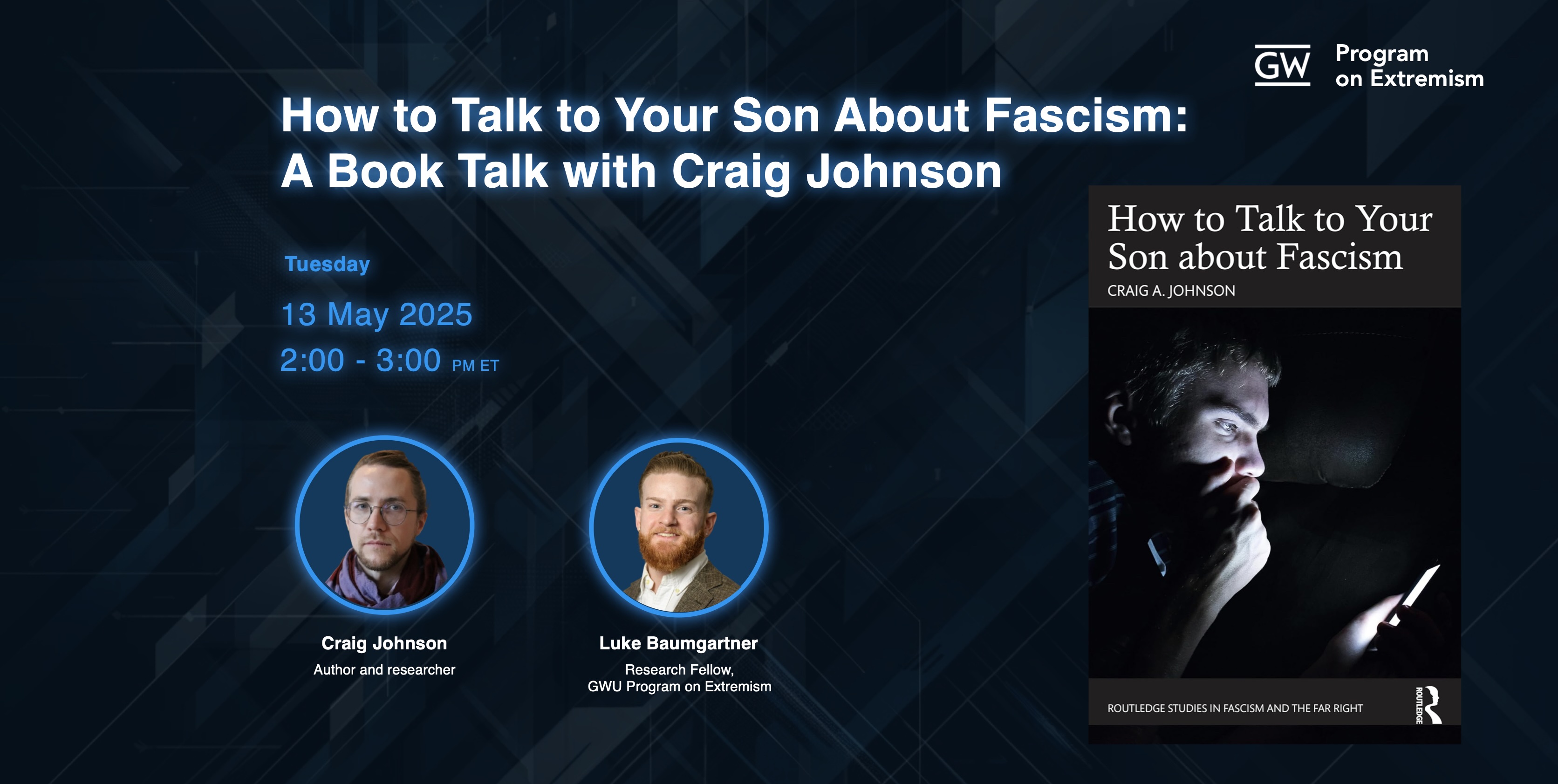How to Talk to Your Son About Fascism
A Book Talk with Craig Johnson
On May 13th, author and researcher Dr. Craig Johnson joined the Program on Extremism in an event to discuss his new book, How to Talk to Your Son About Fascism. The book is a practical guide for parents, guardians, and others on how to talk to young men about fascism, the far-right, and their recruitment tactics. The book examines how and why the far right has historically targeted young men and offers recommendations on how to counter their influence. Research Fellow Luke Baumgartner moderated this event.
On May 13, 2025, the Program on Extremism (PoE) at The George Washington University hosted a virtual discussion with researcher Dr. Craig Johnson, an academic expert on fascism and far-right extremism. The conversation focused on his recent book, How to Talk to Your Son About Fascism, and was moderated by Luke Baumgartner, Research Fellow at PoE.
Dr. Johnson began the discussion by reflecting on a question he’s often asked about his work: “What do you do about this?” That very question forms the foundation of his book, How to Talk to Your Son About Fascism. He called it “ultimately a practical book, a guide to keep young men safer.” Unlike other academic or policy pieces, his book is written for everyday readers, particularly parents, and emphasizes prevention.
The central premise of the book is the belief that “an ounce of prevention is worth a pound of cure.” Rather than deradicalization, Dr. Johnson argues for preemptive conversations to reduce the appeal of fascist ideology, and subsequently its recruitment. Furthermore, Dr. Johnson explained that How to Talk to Your Son About Fascism focuses on countering fascist ideology and recruitment within the private sphere: the home. He underscores the importance of empathetic, family-based conversations, advocating for meaningful dialogue behind closed doors.
To define fascism, Dr. Johnson draws upon scholars such as Roger Griffin and Robert Paxton as primary points of reference. He wanted to provide a “rough and ready” definition that was distinct from conservatism. While the two ideologies have some overlap, he argues that their core principles diverge. Fascists are revolutionaries, while conservatives are not. Fascists believe that violence is good and necessary for the societal overhaul of social, economic, and geopolitical systems.
Dr. Johnson identifies several online platforms, such as YouTube, X, Twitch - formerly 4chan - and online gaming communities, as potential environments where fascist ideas are disseminated and normalized. He references figures like Andrew Tate and Andrew Anglin as popular in fascist circles.
“Fascists appeal to young men, and appeal to young men,” noted Dr. Johnson. He explained that younger people are more likely to risk their lives, bodies, and minds, as their brains are less adept at evaluating long-term risk. As for the gender aspect, fascism is inherently sexist and rooted in male supremacy. He calls fascism a “uniquely male-oriented political ideology,” as opposed to liberalism, conservatism, communism, or even socialism, which may have prescribed gender roles within them, but are not intended for specific male audiences.
He further explains that fascism exploits the perceived oppression of some members of the dominant social group - in this case, white, cisgender, heterosexual men. They feel as though they are losing relative power in an increasingly equitable society. Fascism casts these changes as threats, preying on the feeling, and creating a victim narrative.
To counter this trend, Dr. Johnson recommended that parents begin having conversations with their sons as early as age ten. He emphasized the importance of getting ahead of the information, saying that the conversations need to be held as soon as children are controlling their own media consumption. He warned that parents cannot shield their children from finding the content, so they must be preemptive in engaging in conversations rooted in empathy and curiosity, not shame.
Dr. Johnson empahsized that parents must not fall prey to the misconception that “online” is separate from the “real world.” Online interactions are a child’s social reality, and according to him, pretending otherwise underestimates the risks. In educational settings, he advocates for media literacy as a preventive measure. Teaching students to deconstruct online content by exploring the who, what, and why of messaging should be as much a part of the curriculum as sex education.

